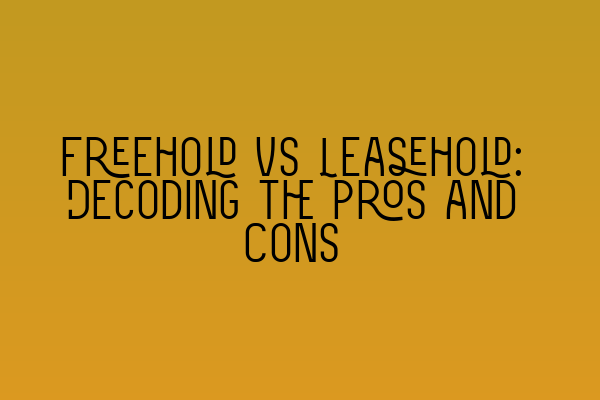Freehold vs Leasehold: Decoding the Pros and Cons
When it comes to purchasing property, one of the key considerations is whether it is freehold or leasehold. These two terms refer to different forms of ownership, each with its own set of advantages and disadvantages. Understanding the pros and cons of freehold and leasehold can help you make an informed decision that aligns with your needs and preferences. In this article, we will decode the differences between freehold and leasehold, and delve into their respective pros and cons.
## Freehold Properties
A freehold property refers to ownership of both the property and the land it stands on. When you purchase a freehold property, you have complete control and ownership rights over the property. This means you are not subject to any restrictions or rules imposed by a landlord or lease agreement.
### Pros of Freehold Properties
1. **Absolute Ownership**: With a freehold property, you have the freedom to make decisions about the property without seeking permission from anyone else. You can make any alterations or modifications to the property as you see fit, subject only to planning and building regulations.
2. **No Ground Rent or Service Charges**: Unlike leasehold properties, freehold properties do not require you to pay ground rent or service charges to a landlord. This can result in significant cost savings over time.
3. **Inheritance**: Freehold properties can be passed down through generations, allowing you to create a lasting legacy for your family.
### Cons of Freehold Properties
1. **Responsibility for Repairs**: As the owner of a freehold property, you bear the responsibility for all maintenance and repairs. This can be a significant financial burden, especially for older properties that may require more frequent repairs.
2. **Limited Community Facilities**: Some freehold properties may lack certain shared amenities or communal spaces that are commonly found in leasehold properties. This can be a disadvantage if you value such facilities.
## Leasehold Properties
Leasehold properties, on the other hand, involve owning the property for a specific period of time, typically between 99 and 999 years. Although the leaseholder has exclusive rights to the property for the duration of the lease, ownership of the land remains with the freeholder.
### Pros of Leasehold Properties
1. **Lower Initial Cost**: Leasehold properties generally have a lower purchase price compared to freehold properties. This can make them more affordable for first-time buyers or individuals on a tight budget.
2. **Shared Responsibilities**: In a leasehold property, the freeholder is responsible for the maintenance and repair of the building’s structure and common areas. This can alleviate some of the financial burden associated with property ownership.
3. **Access to Amenities**: Many leasehold properties come with access to communal gardens, gyms, parking spaces, or other shared facilities. This can be an attractive feature for individuals seeking a sense of community or additional amenities.
### Cons of Leasehold Properties
1. **Ground Rent and Service Charges**: Leasehold properties require the payment of ground rent and service charges to the freeholder. These payments can increase over time and may represent a significant additional expense.
2. **Limited Control**: Leasehold properties are subject to certain restrictions and rules imposed by the lease agreement. This can limit your freedom to make alterations or modifications to the property without obtaining the freeholder’s consent.
3. **Lease Length and Extensions**: The length of the lease can affect the value and marketability of a leasehold property. Additionally, extending a lease can be a complex and costly process, potentially involving negotiations and legal expenses.
In conclusion, the choice between freehold and leasehold properties depends on various factors, including your budget, long-term plans, and personal preferences. Freehold properties offer greater independence and control, but come with the responsibility of repairs and maintenance. Leasehold properties, on the other hand, provide a more affordable entry point into property ownership but come with certain restrictions and ongoing costs.
At SQE Property Law & Land Law, our team of expert solicitors can guide you through the intricacies of freehold and leasehold properties. We provide comprehensive legal advice and services to ensure a smooth and successful property transaction.
For more information on SQE exams and preparation, please check out our related articles:
– [SQE 1 Practice Exam Questions](https://fqps.co.uk/sqe/sqe1-preparation/mcq-practice-quiz)
– [SQE 1 Practice Mocks FLK1 FLK2](https://fqps.co.uk/sqe/sqe1-preparation/practice-mocks-quiz)
– [SQE 2 Preparation Courses](https://fqps.co.uk/sqe/sqe2-preparation)
– [SQE 1 Preparation Courses](https://fqps.co.uk/sqe/sqe1-preparation)
– [SRA SQE Exam Dates](https://fqps.co.uk/sqe/sqe1-sqe2-exam-dates)
Contact us today for professional advice and assistance with your property ownership journey.
